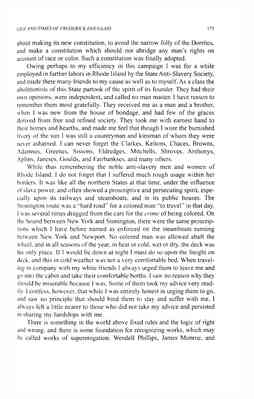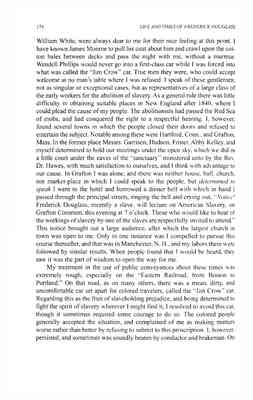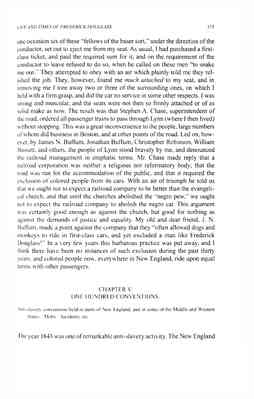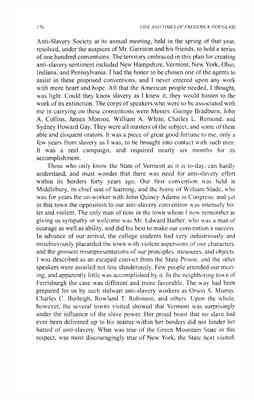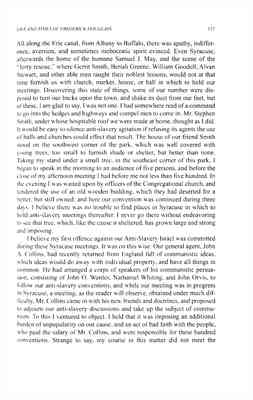Pages
21
LIFE AND TIMES OF FREDERICK DOUGLASS 173
about making its new constitution, to avoid the narrow folly of the Dorrites, and make a constitution which should not abridge any man's rights on account of race or color. Such a constitution was finally adopted.
Owing perhaps to my efficiency in this campaign I was for a while employed in further labors in Rhode Island by the State Anti-Slavery Society, and made there many friends to my cause as well as to myself. As a class the abolitionists of this State partook of the spirit of its founder. They had their own opinions, were independent, and called no man master. I have reason to remember them most gratefully. They received me as a man and a brother, when I was new from the house of bondage, and had few of the graces derived from free and refined society. They took me with earnest hand to their homes and hearths, and made me feel that though I wore the burnished livery of the sun I was still a countryman and kinsman of whom they were never ashamed. I can never forget the Clarkes, Keltons, Chaces, Browns, Adamses, Greenes, Sissons, Eldredges, Mitchells, Shroves, Anthonys, Aplins, Janeses, Goulds, and Fairbankses, and many others.
While thus remembering the noble anti-slavery men and women of Rhode Island, I do not forget that I suffered much rough usage within her borders. It was like all the northern States at that time, under the influence of slave power, and often showed a proscriptive and persecuting spirit, especially upon its railways and steamboats, and in its public houses. The Stonington route was a "hard road" for a colored man "to travel" in that day. I was several times dragged from the cars for the crime of being colored. On the Sound between New York and Stonington, there were the same proscriptions which I have before named as enforced on the steamboats running between New York and Newport. No colored man was allowed abaft the wheel, and in all seasons of the year, in heat or cold, wet or dry, the deck was his only place. If I would lie down at night I must do so upon the freight on deck, and this in cold weather was not a very comfortable bed. When traveling in company with my white friends I always urged them to leave me and go into the cabin and take their comfortable berths. I saw no reason why they should be miserable because I was. Some of them took my advice very readily, I confess, however, that while I was entirely honest in urging them to go, and saw no principle that should bind them to stay and suffer with me, I always felt a little nearer to those who did not take my advice and persisted in sharing my hardships with me.
There is something in the world above fixed rules and the logic of right and wrong, and there is some foundation for recognizing works, which may be called works of supererogation. Wendell Phillips, James Monroe, and
22
174 LIFE AND TIMES OF FREDERICK DOUGLASS
William White, were always dear to me for their nice feeling at this point. I have known James Monroe to pull his coat about him and crawl upon the cotton bales between decks and pass the night with me, without a murmur. Wendell Phillips would never go into a first-class car while I was forced into what was called the "Jim Crow" car. True men they were, who could accept welcome at no man's table where I was refused. I speak of these gentlemen, not as singular or exceptional cases, but as representatives of a large class of the early workers for the abolition of slavery. As a general rule there was little difficulty in obtaining suitable places in New England after 1840, where I could plead the cause of my people. The abolitionists had passed the Red Sea of mobs, and had conquered the right to a respectful hearing. I, however, found several towns in which the people closed their doors and refused to entertain the subject. Notable among these were Hartford, Conn., and Grafton, Mass. In the former place Messrs. Garrison, Hudson, Foster, Abby Kelley, and myself determined to hold our meetings under the open sky, which we did in a little court under the eaves of the "sanctuary" ministered unto by the Rev. Dr. Hawes, with much satisfaction to ourselves, and I think with advantage to our cause. In Grafton I was alone, and there was neither house, hall, church, nor market-place in which I could speak to the people, but determined to speak I went to the hotel and borrowed a dinner bell with which in hand I passed through the principal streets, ringing the bell and crying out, "Notice! Frederick Douglass, recently a slave, will lecture on American Slavery, on Grafton Common, this evening at 7 o'clock. Those who would like to hear of the workings of slavery by one of the slaves are respectfully invited to attend." This notice brought out a large audience, after which the largest church in town was open to me. Only in one instance was I compelled to pursue this course thereafter, and that was in Manchester, N.H., and my labors there were followed by similar results. When people found that I would be heard, they saw it was the part of wisdom to open the way for me.
My treatment in the use of public conveyances about these times was extremely rough, especially on the "Eastern Railroad, from Boston to Portland." On that road, as on many others, there was a mean, dirty, and uncomfortable car set apart for colored travelers, called the "Jim Crow" car. Regarding this as the fruit of slaveholding prejudice, and being determined to fight the spirit of slavery wherever I might find it, I resolved to avoid this car. though it sometimes required some courage to do so. The colored people generally accepted the situation, and complained of me as making matters worse rather than better by refusing to submit to this proscription. I, however. persisted, and sometimes was soundly beaten by conductor and brakeman. On
23
LIFE AND TIMES OF FREDERICK DOUGLASS 175
one occasion six of these "fellows of the baser sort," under the direction of the conductor, set out to eject me from my seat. As usual, I had purchased a firstclass ticket, and paid the required sum for it, and on the requirement of the conductor to leave refused to do so, when he called on these men "to snake me out." They attempted to obey with an air which plainly told me they relished the job. They, however, found me much attached to my seat, and in removing me I tore away two or three of the surrounding ones, on which I held with a firm grasp, and did the car no service in some other respects. I was strong and muscular, and the seats were not then so firmly attached or of as solid make as now. The result was that Stephen A. Chase, superintendent of the road, ordered all passenger trains to pass through Lynn (where I then lived) without stopping. This was a great inconvenience to the people, large numbers of whom did business in Boston, and at other points of the road. Led on, however, by James N. Buffum, Jonathan Buffum, Christopher Robinson, William Bassett, and others, the people of Lynn stood bravely by me, and denounced the railroad management in emphatic terms. Mr. Chase made reply that a railroad corporation was neither a religious nor reformatory body; that the road was run for the accommodation of the public, and that it required the exclusion of colored people from its cars. With an air of triumph he told us that we ought not to expect a railroad company to be better than the evangelical church, and that until the churches abolished the "negro pew," we ought not to expect the railroad company to abolish the negro car. This argument was certainly good enough as against the church, but good for nothing as against the demands of justice and equality. My old and dear friend, J. N. Buffum, made a point against the company that they "often allowed dogs and monkeys to ride in first-class cars, and yet excluded a man like Frederick Douglass!" In a very few years this barbarous practice was put away, and I think there have been no instances of such exclusion during the past thirty years; and colored people now, everywhere in New England, ride upon equal terms with other passengers.
CHAPTER V. ONE HUNDRED CONVENTIONS.
Anti-slavery conventions held in parts of New England, and in some of the Middle and Western States—Mobs—Incidents, ect.
The year 1843 was one of remarkable anti-slavery activity. The New England
24
176 LIFE AND TIMES OF FREDERICK DOUGLASS
Anti-Slavery Society at its annual meeting, held in the spring of that year, resolved, under the auspices of Mr. Garrison and his friends, to hold a series of one hundred conventions. The territory embraced in this plan for creating anti-slavery sentiment included New Hampshire, Vermont, New York, Ohio, Indiana, and Pennsylvania. I had the honor to be chosen one of the agents to assist in these proposed conventions, and I never entered upon any work with more heart and hope. All that the American people needed, I thought, was light. Could they know slavery as I knew it, they would hasten to the work of its extinction. The corps of speakers who were to be associated with me in carrying on these conventions were Messrs. George Bradburn, John A. Collins, James Monroe, William A. White, Charles L. Remond, and Sydney Howard Gay. They were all masters of the subject, and some of them able and eloquent orators. It was a piece of great good fortune to me, only a few years from slavery as I was, to be brought into contact with such men. It was a real campaign, and required nearly six months for its accomplishment.
Those who only know the State of Vermont as it is to-day, can hardly understand, and must wonder that there was need for anti-slavery effort within its borders forty years ago. Our first convention was held in Middlebury, its chief seat of learning, and the home of William Slade, who was for years the co-worker with John Quincy Adams in Congress; and yet in this town the opposition to our anti-slavery convention was intensely bitter and violent. The only man of note in the town whom I now remember as giving us sympathy or welcome was Mr. Edward Barber, who was a man of courage as well as ability, and did his best to make our convention a success. In advance of our arrival, the college students had very industriously and mischievously placarded the town with violent aspersions of our characters, and the grossest misrepresentations of our principles. measures. and objects. I was described as an escaped convict from the State Prison, and the other speakers were assailed not less slanderously. Few people attended our meeting, and apparently little was accomplished by it. In the neighboring town of Ferrisburgh the case was different and more favorable. The way had been prepared for us by such stalwart anti-slavery workers as Orson S. Murray, Charles C. Burleigh, Rowland T. Robinson, and others. Upon the whole, however, the several towns visited showed that Vermont was surprisingly under the influence of the slave power. Her proud boast that no slave had ever been delivered up to his master within her borders did not hinder her hatred of anti-slavery. What was true of the Green Mountain State in this respect, was most discouragingly true of New York, the State next visited.
25
LIFE AND TIMES OF FREDERICK DOUGLASS 177
All along the Erie canal, from Albany to Buffalo, there was apathy, indifference, aversion, and sometimes mobocratic spirit evinced. Even Syracuse, afterwards the home of the humane Samuel J. May, and the scene of the "Jerry rescue," where Gerrit Smith, Beriah Greene, William Goodell, Alvan Stewart, and other able men taught their noblest lessons, would not at that time furnish us with church, market, house, or hall in which to hold our meetings. Discovering this state of things, some of our number were disposed to turn our backs upon the town, and shake its dust from our feet, but of these, I am glad to say, I was not one. I had somewhere read of a command to go into the hedges and highways and compel men to come in. Mr. Stephen Smith, under whose hospitable roof we were made at home, thought as I did. It would be easy to silence anti-slavery agitation if refusing its agents the use of halls and churches could effect that result. The house of our friend Smith stood on the southwest corner of the park, which was well covered with young trees, too small to furnish shade or shelter, but better than none. Taking my stand under a small tree, in the southeast comer of this park, I began to speak in the morning to an audience of five persons, and before the close of my altemoon meeting I had before me not less than five hundred. In the evening I was waited upon by officers of the Congregational church, and tendered the use of an old wooden building, which they had deserted for a better, but still owned; and here our convention was continued during three days. I believe there was no trouble to find places in Syracuse in which to hold anti-slavery meetings thereafter. I never go there without endeavoring to see that tree, which, like the cause it sheltered, has grown large and strong and imposing.
I believe my first offence against our Anti-Slavery Israel was committed during these Syracuse meetings. It was on this wise: Our general agent, John A. Collins, had recently returned from England full of communistic ideas, which ideas would do away with individual property, and have all things in common. He had arranged a corps of speakers of his communistic persuasion, consisting of John O. Wattles, Nathaniel Whiting, and John Orvis, to follow our anti-slavery conventions, and while our meeting was in progress in Syracuse, a meeting, as the reader will observe, obtained under much difficulty, Mr. Collins came in with his new friends and doctrines, and proposed to adjourn our anti-slavery discussions and take up the subject of communism. To this I ventured to object. I held that it was imposing an additional burden of unpopularity on our cause, and an act of bad faith with the people, who paid the salary of Mr. Collins, and were responsible for these hundred conventions. Strange to say, my course in this matter did not meet the
